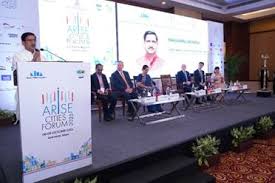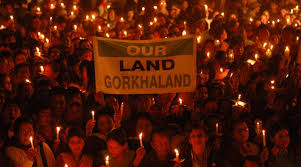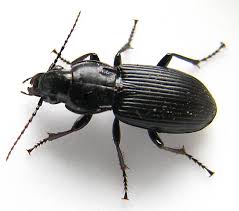Today’s Current Affairs: 22nd October 2025 for UPSC IAS exams, State PSC exams, SSC CGL, State SSC, RRB, Railways, Banking Exam & IBPS, etc
Table of Contents
Delhi Declaration 2025:

The Delhi Declaration on Local Action for Global Climate Goals, adopted at the ARISE Cities Forum 2025 in New Delhi, is set to be presented at COP30 in Belém, Brazil. It serves as a landmark commitment from cities of the Global South to shape climate action through multilevel governance.
- The Delhi Declaration 2025 marks a major milestone in strengthening urban climate leadership and resilience, especially across the Global South.
Key Commitments of the Delhi Declaration: - It Strengthen and resource multilevel Nationally Determined Contributions (NDCs) for measurable climate outcomes.
- It Promote adaptation, circular economy practices, and nature-based solutions in city planning.
- Ensure fairness and equity in the shift toward net-zero emissions.
- Expand participation of women, youth, and communities in climate decision-making.
- Build data-driven, transparent, and accountable systems for urban climate action.
- Enable direct and predictable access to climate finance for cities.
- Encourage South-South cooperation, innovation, and knowledge sharing.
- The declaration represents a collective urban commitment to act locally while influencing global climate policy.
- It positions cities as pivotal players in achieving sustainable, resilient, and equitable growth pathways.
China Challenges India’s EV Subsidies at WTO:

China has approached the World Trade Organization (WTO) against India, alleging that the country’s electric vehicle (EV) and battery subsidies provide an “unfair competitive advantage” to domestic manufacturers.
- China claims India’s subsidies breach WTO obligations, including the national treatment principle (requiring that imported goods be treated no less favorably than domestic goods once they enter the market).
- India’s EV subsidies on best-selling vehicles (including GST cuts, tax waivers, and PLI support) offer around 46% cost aid, far higher than the 10–26% subsidy levels in other major economies.
- China argues these measures breach the WTO’s Agreement on Subsidies and Countervailing Measures (which provides rules for use of government subsidies and remedies to address subsidized trade) by favouring Indian producers and distorting fair competition.
- China also claims that the subsidies also amount to prohibited import substitution subsidies (government financial aid for companies that are conditional on using domestic goods instead of imported ones, a practice deemed to distort international trade unfairly), favoring domestic EV industries over foreign competitors.
Gorkhaland Movement:

The Union Government has appointed the former Deputy National Security Adviser (NSA) as interlocutor to engage with Darjeeling hill leaders on key demands, including Gorkhaland statehood and ST status for 11 Gorkha sub-tribes.
- The move aims to find a political resolution to long-standing identity and autonomy issues in the region.
- The West Bengal state government has criticized the decision as “unilateral” and inconsistent with the principles of cooperative federalism.
- Article 3 empowers Parliament to form new states or alter existing boundaries.
- The state legislature’s opinion is consultative, not binding, ensuring national flexibility.
- However, frequent boundary demands, such as Gorkhaland, strain Centre–State relations and test India’s federal harmony.
- The demand, therefore, is not just political but also a test of constitutional accommodation within the Indian Union.
- Demand for a Separate State: Demand for Gorkhaland has been Central to Gorkha identity politics since the 1980s, reflecting aspirations for recognition and self-governance.
- Proposed to include Darjeeling, Terai, and Dooars regions within West Bengal.
- Demand for Scheduled Tribe (ST) Status: 11 Gorkha sub-tribes—including Rai, Limbu, Gurung, Tamang, and others—seek ST recognition.
- Would enable access to reservation benefits, education, and government jobs.
- Despite multiple assurances, the recognition process remains pending, deepening community frustration.
- Concerns over the Agnipath Scheme: The short-term Agnipath military recruitment policy created uncertainty among Nepali-origin Gorkhas, traditionally serving in the armed forces.
- Nepal raised concerns that it may violate the 1947 Tripartite Agreement, which guaranteed pension and service rights.
- Reports indicate China’s possible interest in recruiting Gorkhas, raising strategic concerns.
- Maintaining robust India–Nepal–Darjeeling coordination is vital for border stability and preventing external influence.
Gorkhaland Movement:
- Origins (1980s): The demand for a separate state of Gorkhaland was first raised by Subhash Ghising, founder of the Gorkha National Liberation Front (GNLF).
- The agitation, driven by identity and administrative concerns, witnessed widespread violence and prolonged strikes during the 1980s.
- The movement resurfaced strongly in 2017, leading to 104 days of strikes and clashes across Darjeeling and adjoining hills under the Gorkha Janmukti Morcha (GJM).
Six-Pocket Syndrome:

A Kaun Banega Crorepati episode featuring a child’s overconfident behaviour towards Amitabh Bachchan has sparked debate on overindulgent parenting among Generation Alpha (people born from 2010-2024/25), which experts link to the “Six-Pocket Syndrome.”
- The Six-Pocket Syndrome, a term from China’s one-child policy era (1979-2015), describes how one child was doted on by six adults (two parents and four grandparents) who poured all their affection and resources into them.
- This overindulgence fostered entitlement and a sense that every wish deserves to be fulfilled, leaving little room for discipline, patience, or empathy.
- In India, the Six-Pocket Syndrome is common in urban middle-class families, where working parents and indulgent grandparents shower children with attention, gifts, and leniency.
- This overcompensation fosters a belief in the right to demand and be rewarded instantly, without understanding effort, boundaries, or consequences.
- Reflects the shift from a responsibility-based society (where children contribute and adapt) to a right-based society (where children feel entitled to comfort and attention).
- Erving Goffman’s “Dramaturgical Perspective”: Explains how modern children, shaped by family and media, learn to perform roles that attract validation rather than build character.
- Childhood becomes a stage for social approval rather than moral learning.
- Zygmunt Bauman’s “Liquid Modernity”: States that society now prioritises instant gratification, fluid identities, and social visibility over long-term emotional grounding.
Rangarajan Poverty Line:

Economists from the Reserve Bank of India’s (RBI) Department of Economic and Policy Research published a paper in which they ‘updated’ the Rangarajan Poverty Line for 20 major states of India, using data from the Household Consumption Expenditure Survey (HCES) 2022-23.
Key Highlights of RBI’s Paper on Updated Rangarajan Poverty Line:
- Odisha and Bihar showed the largest decline in poverty levels since 2011-12, with rural poverty in Odisha falling from 47.8% to 8.6% and urban poverty in Bihar falling from 50.8% to 9.1%.
- Kerala and Himachal Pradesh showed the least decline in poverty percentages because their poverty levels were already low.
- In 2022-23, rural poverty was lowest in Himachal Pradesh (0.4%) and highest in Chhattisgarh (25.1%). Urban poverty was lowest in Tamil Nadu (1.9%) and highest in Chhattisgarh (13.3%).
- The study acknowledges that consumption patterns changed between 2011-12 and 2022-23, suggesting that poverty baskets and lines may need further updates in the future.
Carabid Beetle:

Researchers found that carabid ground beetles act as potential bioindicators to track soil microplastics.
- They are commonly known as ground beetles due to their habitat and behavior.
- Ground beetles (Carabidae) are an important family of invertebrates known to strongly influence food web structure, often as key predators or prey species.
- It belongs to the family
- Carabid beetles are found in a wide variety of habitats, including forests, grasslands, agricultural fields, wetlands, and even urban areas.
- They are adapted to diverse climatic conditions, from temperate to tropical regions.
- They are known for their long legs and powerful mandibles which enable them to be voracious predators.
- They are infamous for their pungent smell, which they emit when they’re threatened.
- They are mainly dependent on garden pests, including snails, caterpillars, slugs, and other small invertebrates.
- Ground beetles have four distinct life stages: egg, larva, pupa, and adult.
- Reproduction in carabids is typically sexual, with internal fertilization.
- They are important for the biological control of insect pests on farms.
Tuvalu Becomes 90th Member of IUCN Amid Climate Crisis:
Tuvalu, one of the world’s smallest and most climate-vulnerable nations, has officially joined the International Union for Conservation of Nature (IUCN) as its 90th State Member. The move marks a significant step for the island nation in strengthening its environmental governance and global engagement in conservation efforts.Tuvalu, located in the Pacific Ocean, comprises nine atolls and low-lying islands with a land area of just 26 square kilometres. However, it commands an Exclusive Economic Zone (EEZ) of nearly 900,000 sq km, teeming with coral reefs, fisheries, and migratory seabirds.
Sunil Amrith Wins British Academy Prize for “The Burning Earth”:
Indian-origin historian Sunil Amrith has won the 2025 British Academy Book Prize for his groundbreaking work, The Burning Earth: An Environmental History of the Last 500 Years. The prestigious £25,000 award celebrates outstanding non-fiction in the humanities and social sciences, highlighting writing that enhances public understanding of global issues through rigorous scholarship. Amrith’s latest book offers a sweeping narrative that connects empire, environment, and human progress, earning acclaim for its relevance in today’s climate-conscious world.




